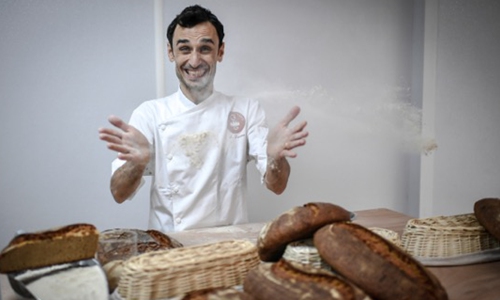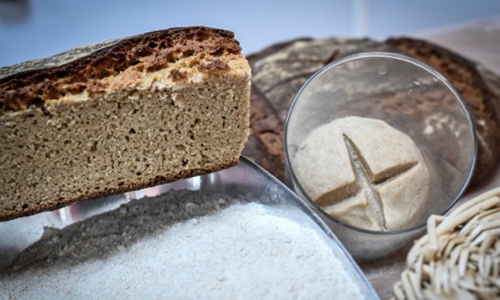Italian dares to make French bread great again
Source:AFP Published: 2020/3/15 15:43:40

Italian founder of Pane Vivo Adriano Farano poses during a photo session on Wednesday at the Pane Vivo bakery production site in Paris. Photo: AFP

Italian founder of Pane Vivo Adriano Farano poses during a photo session on Wednesday at the Pane Vivo bakery production site in Paris. Photo: AFP
Adriano Farano is on a mission to teach the French how to make great bread again.
The Italian admits that this takes quite some courage, and no little "cheek."
"I want to get back to true French bread," declared Farano, claiming that it has been robbed of its taste and goodness by intensive agriculture and the country's big millers.
And the baguette - that quintessential icon of Frenchness - is the symbol of all that has gone wrong, he said
"It's the worst bread possible... a modern, industrial invention made with white flour that has completely lost its nutrients.
"It has a glycemic index of 90 out of 100!" despaired the passionate advocate of "real" bread.
"You drink Coca-Cola, you eat a baguette, it's the same thing," the serial dotcom entrepreneur told AFP.
The country that brought the world the sourdough with which Californian hipsters' now make their avocado toast, badly needs to get back to its wholesome, wholegrain roots, Farano argued.
So far, the French are taking it on the chin.
In fact, the Parisien newspaper has hailed Farano's bread - made with an ancient strain of durum wheat and a 133-year-old sourdough levain - as "incredible."
Modern bread is 'bad'
It listed it among the 20 best rustic breads to be found in the French capital even before his Pane Vivo bakery (the name means "living bread") had officially opened this week.
France's boulangeries may offer an array of temptations "like nothing else in the world," Farano admitted, but the industry "has completely forgotten about health."
Farano became obsessed with slow bread and sourdough after selling his last Silicon Valley startup to the video platform Plex.
With his youngest son born just as Donald Trump was elected to the White House in 2016, "I wanted to give him something good to eat, something that is both good for the palette and also for the body. In sourdough bread I found that."
The problem was that "all the bread from the bakery comes from modern wheats which are very bad for your health and worse for the planet," guzzling up vast quantities of water and fertilizers.
Farano also began to look hard at gluten - the much-demonized protein in wheat - before discovering that the problem was not "gluten itself, but the quality of it."
New hybrids wheats have sent yields rocketing seven-fold in a century, "but the gluten in modern varieties is extremely hard to digest," he said.
"The gluten residues scrape the wall of the gut and the problems start when it gets into the bloodstream," which is why he turned to ancient wheat. Farano chanced upon Russello, a very old variety of durum grown in Sicily that seemed to defy his preconceptions, being both high in protein and easy to digest.
He had the France's national food laboratory test the bread he made from it against similar sourdoughs from some of the French capital's most chi-chi boulangeries.
Sourdough we can digest
The result shocked even him. While his bread had "zero gluten residues, 9 to 10 percent of the bread proteins did not break down in these supposedly very good sourdough breads."
Even though his own Russello is organic, Farano believes that "organic is a scam" if the flour comes from modern wheats.
While he is a radical, Farano is far from alone in wanting to make French bread rise again.
A "neo-boulangerie" movement inspired by the likes of levain guru Thomas Teffri-Chambelland is reaching back to a time when the French ate rustic breads like the famous "six livres," which weighed in at nearly three kilograms.
But wheat is only one part of the problem, Farano argued. The rest lies with the milling, Farano argued, ("it should be with stone") and the yeast used.
Even some of the bakers hailed for reviving sourdough bread in France using some brewer's yeast for speed and consistency, Farano claimed, whose own starter began life in the heel of Italy in 1887.
"Alcoholic fermentation will always dominate," Farano said. Pure sourdough lactic fermentation is slow but essential "for real bread. In one gram of sourdough there is a billion bacteria and 100 million yeast cells. It's a miracle," Farano thrilled.
"Bread is the only food which becomes the flesh of the God for some religions. Yet we have destroyed it. As a civilization, we need to take this back."
Newspaper headline: Rising to the challenge
Posted in: FOOD,CULTURE & LEISURE,ARTS FOCUS